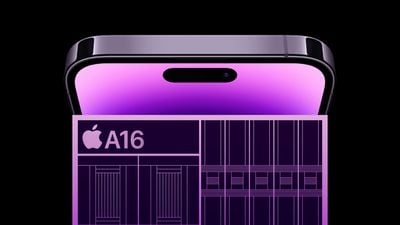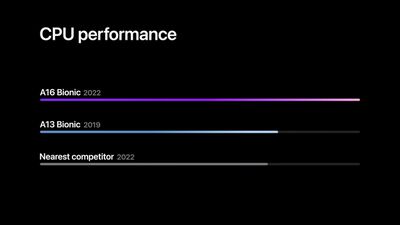Earlier this week, Qualcomm announced its latest Snapdragon 8 Gen 2 mobile chip and platform, promising to "revolutionize flagship smartphones" with "groundbreaking" experiences. The new chip is expected to launch in flagship Android smartphones later this year, but benchmarks suggest it cannot compete with Apple's A16 Bionic chip, which powers iPhone 14 Pro models.

While the latest chip won't officially ship in smartphones for a few months, Geekbench scores for the chip have already been spotted in an unreleased Android handset. According to the results (via DealNTech), the latest Snapdragon 8 chip scored 1483 in single-core and 4709 in multi-core. The A16 Bionic scored 1874 in single-core and 5372 in multi-core. For comparison, the A15 Bionic chip, found in the iPhone 13 Pro and the lower-end iPhone 14 models, also scored higher than Qualcomm's latest chip with 1709 in single-core compared to 1483.
In a press release for the new chip, Qualcomm said it will "define a new standard for connected computing, intelligently engineered with groundbreaking AI across the board to enable extraordinary experiences." Qualcomm's senior vice president and general manager of mobile handsets, Chris Patrick, said, "Snapdragon 8 Gen 2 will revolutionize the landscape of flagship smartphones in 2023."
Compared to the first-generation Snapdragon 8 chip, Qualcomm says the newer platform offers a 35% increase in CPU performance, a 25% increase in GPU performance, and an increase in power efficiency. In 2020, Apple's A14 Bionic and even the A13 Bionic chip from the year earlier beat Qualcomm's Snapdragon 888 chip that launched on Android devices last year.

The A16 Bionic chip in the iPhone 14 Pro, like the latest Snapdragon 8 Gen 2 chip, is built on TSMC's 4nm process, and both offer improved performance and energy efficiency. The A16 Bionic chip features 16 billion transistors, a 6-core CPU, a 5-core GPU, and a 16-core Neural Engine. "The competition is still working to catch up to the performance of the A13, which we first introduced with iPhone 11 three years ago," said Greg Joswiak, Apple's senior vice president of worldwide marketing, during the Apple event in September.























